Aίθουσα “TΩNIA ΜΑΡΚΕΤΑΚΗ”, Αποθήκη Δ’
Ημερομηνία: 19 Οκτωβρίου 2024
ΕΙΣΙΤΗΡΙΑ ΓΙΑ ΤΙΣ ΠΡΟΒΟΛΕΣ ΣΤΗΝ ΑΠΟΘΗΚΗ Δ, ΛΙΜΑΝΙ:
Δύο προβολές την ημέρα: 7 €
Μια προβολή την ημέρα: 5 €
Ώρες προβολών:
Α προβολή: 17.00-20.00
Β προβολή: 20.30-23.30
Προμηθευτείτε το εισιτήριο σας στα εκδοτήρια στην είσοδο του χώρου.
Α’
Mothers & Monsters
Edith Jorisch, Canada
15′ 45”
For a very special celebration, a host-mother has gathered mothers and their perfect children for a great banquet. Orchestrated by the host-mother, the banquet is suddenly disrupted by strange disturbances. What is hiding behind the scenes of this perfect ideal world? Mothers and Monsters is a surrealist satire about modern-day maternity and the ideal of the family at a time where capitalism has reached its apex.
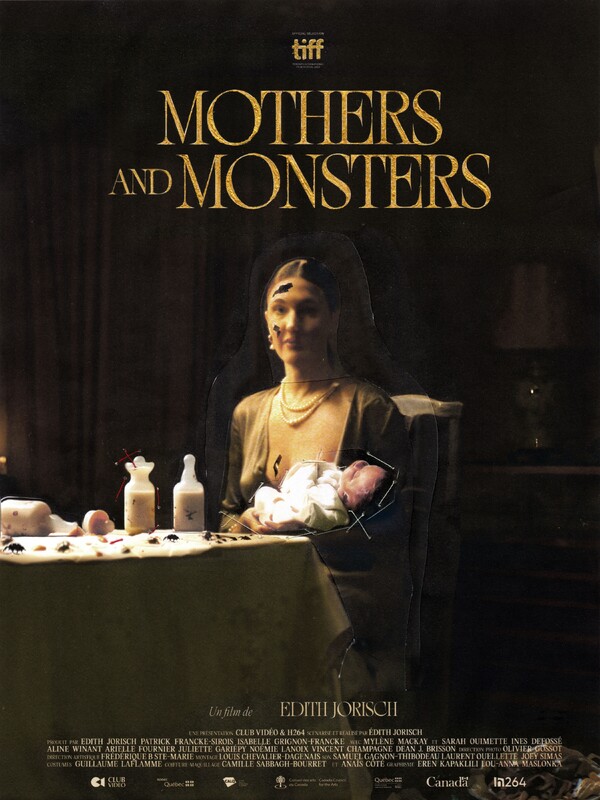
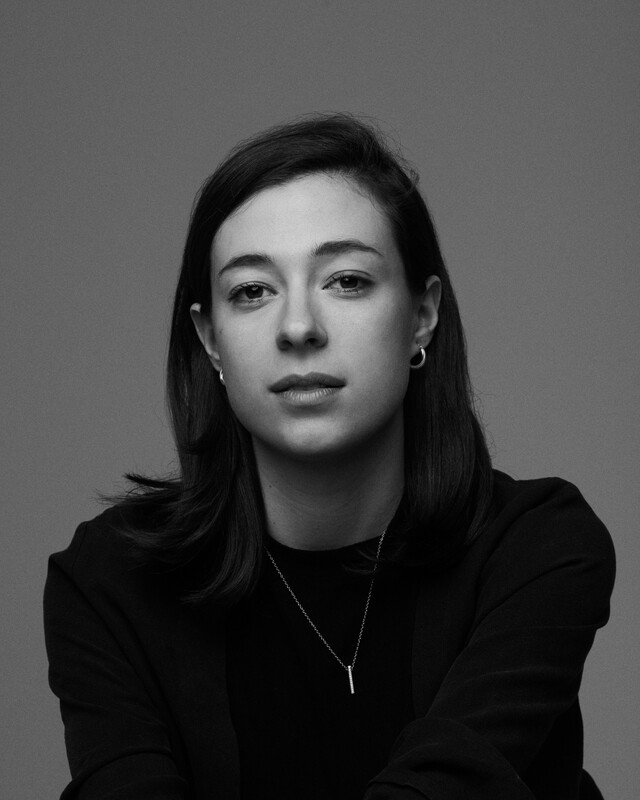
Director Biography – Edith Jorisch
“The Montrealer Édith Jorisch directs and writes works of all genres (fiction, documentary, virtual reality). Her work offers a human, bittersweet perspective on contemporary vices. Her most recent short film, “”Tibbits Hill,”” won the award for Best Quebec Fiction Film at RVQC (2022).
The ecofiction “”Plastisapiens”” by the director received an award at IDFA and was also presented at Tribeca, SXSW, and FIPADOC.
Édith is currently working on the scripts for two feature-length films.”
~
Unfamiliar Skin
Gustavo Milan, Brazil
17′
During easter holiday, the intimate relationship between a 12-year-old boy and his mother comes to an end when the boy experiences his first sexual awakening.
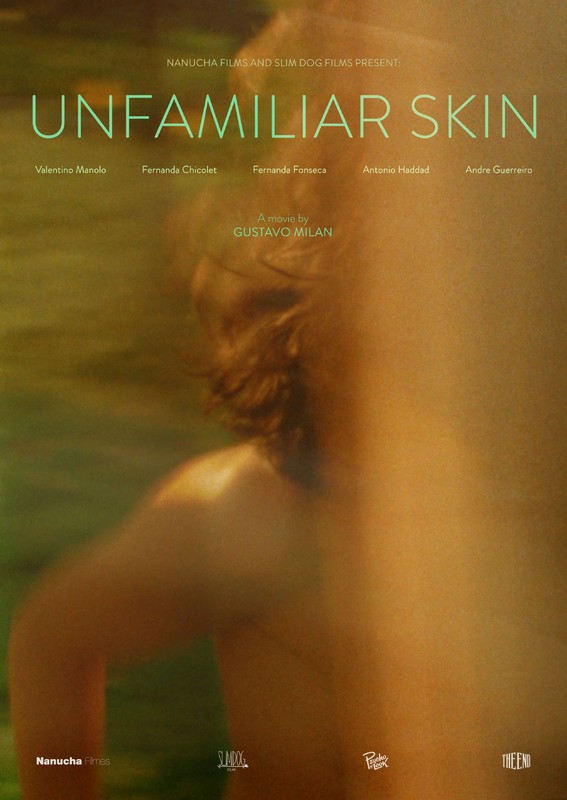
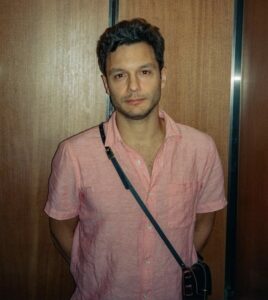
Director Biography – Gustavo Milan
Gustavo Milan is a Brazilian filmmaker currently living in New York City. In 2022 he graduated from the NYU Tisch Graduate Film Program and received the Wasserman Award, NYU’s top honor in recognition for outstanding directorial achievement.
His latest short film Seiva Bruta (Under the Heavens) premiered at Telluride and won the award for Best Latino Short Film from the Directors Guild of America.
Seiva Bruta (Under the Heavens) was also shortlisted at the 2022 Academy Awards. The movie was also acquired by The New Yorker Magazine and the Criterion Channel.
Currently Gustavo is working on the development of his first feature film “Paula and Cristina”: “When only the youngest of two orphan sisters receives a proposal to be adopted, the teenage siblings have to decide if they will continue living together or
part ways forever.”
~
Nothing about you scares me
Justyna Nowak, Poland
30′
Nic mnie w tobie nie przeraża / Pierwszy post-hipsterski melodramat
During the production of the play based on Aristophanes’ “Birds” three artist friends need to take responsibility for the roles they play in their social microcosm. The first post-hipster melodrama which tells a story of unusual declaration of love.
LOGLINE :
A trio of friends – unfulfilled artists, see a chance to break out of their professional limbo in the arrival of a visionary director. Matilda’s anxiety about aspiring for a job, triggers memories of her beloved’s betrayal with her best narcissistic friend.
Trailer 1 https://vimeo.com/nowakjustyna/nothingaboutu
Trailer 2 https://vimeo.com/nowakjustyna/nothingaboutu2
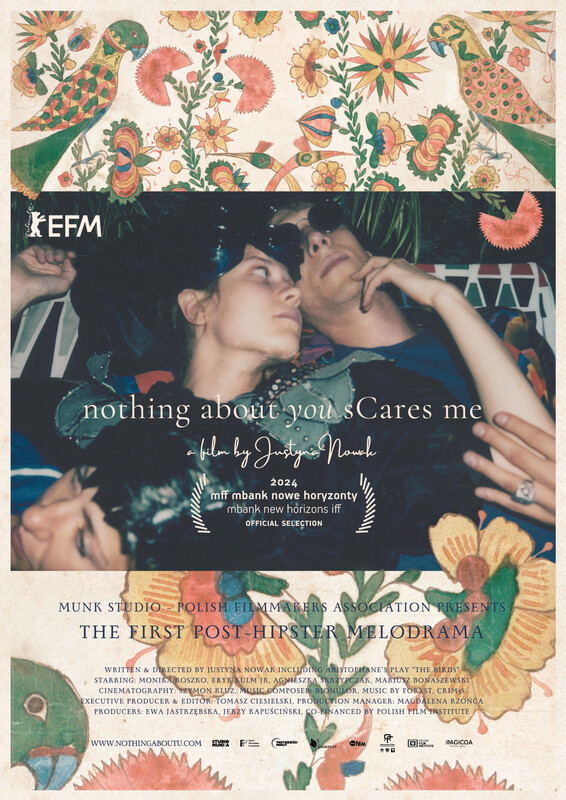
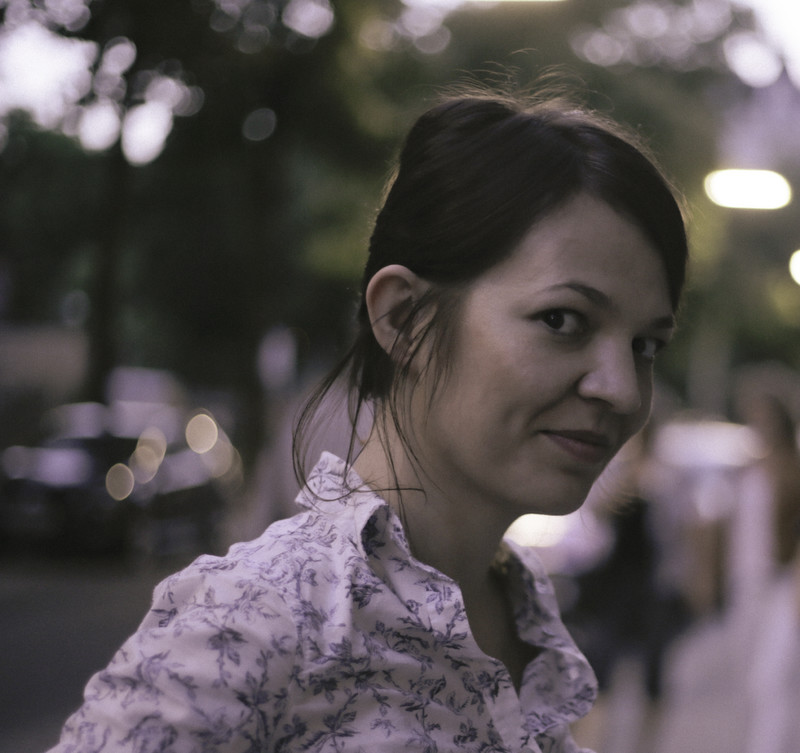
Director Biography – Justyna Nowak
Justyna Nowak – graduated film directing at the National Film School in Lodz. Known for a feature short “Dragonflies” that competed in 64 Venice Film Festival. “Dragonflies” took part in the competition of Clermont-Ferrand Film Fest. and won Best European Short at Raindance Film Festival in London. Her films are mainly comedy-dramas, inspired by the French New Wave. They dive into the social themes of female issues. Her last production was an experimental film with elements of theatre “Beauty”. An alumna of Berlinale Talents.
Filmography – https://vimeo.com/nowakjustyna
Director Statement
As I finished my mostly dreaming studies at the Lodz Film School, my world quickly turned into a reality filled with more or less fulfilled and distressed artists whose fate I shared. I am not a passive observer of all the ups and downs of art graduates, but an active participant in this universe. I know it better than anything.
Out of these experiences, I decided to build a psychological study of artists tangled in a social triangle (Matylda, Helena and Yuri). A film about universal artistic frustrations and dilemmas set in the scenery of a quiet, small town and local theatre. The protagonists find themselves in a moment of life and creativity crisis, and they see their way out of this limbo in the arrival of a visionary director. The moment of competing for professional and life chances is mixed with the memory of rivalry for the beloved. That is why summer and autumn are shuffled in the script. Radical changes in the lives of protagonists happen two months apart. In a short period ahead, many things will take on completely different shades – a great friendship with a clearly one-sided character. Conscious and unconscious narcissism as an integral component of creative work. A love that is real and one that is made up. Responsibility for the role one has taken on in a fragile, social microcosm.
~
The Revenge Of Female Statues
Vanessa Ferle, Greece
5′ 12”
African-American writer and activist June Jordan and her “Poem About My Rights”; Ancient Greece and the emblematic statues of Winged Victory of Samothrace, Venus de Milo and Small Herculaneum Woman; Japanese Traditions and the men-only Noh theater; are merged together to talk -from a feminine point of view- about universal and transgenerational inequalities, abuse, violations, of women and all the vulnerable.
In this work temporal space is ignored and various cultural elements of different times and places are retrieved to construct a storytelling on today’s issue of respect for the other; whoever or whichever this other is. A matter of power, that matters to femininities, and all other humans or animals belonging to minorities. An issue that has been present throughout history, in various forms and intensity, but is still not resolved.
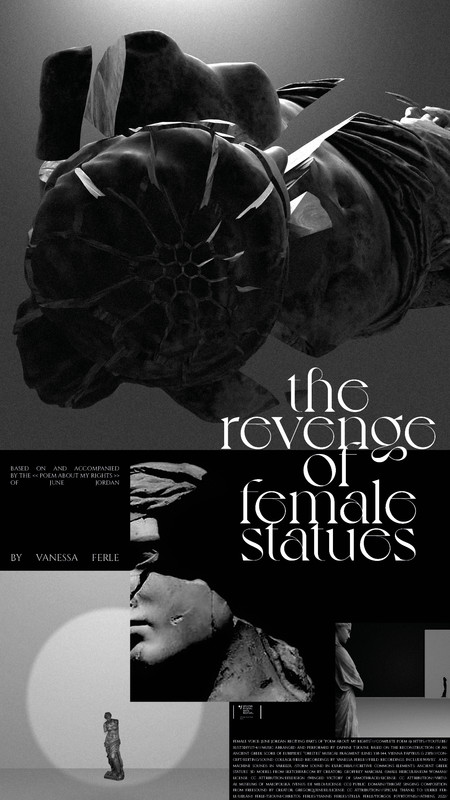
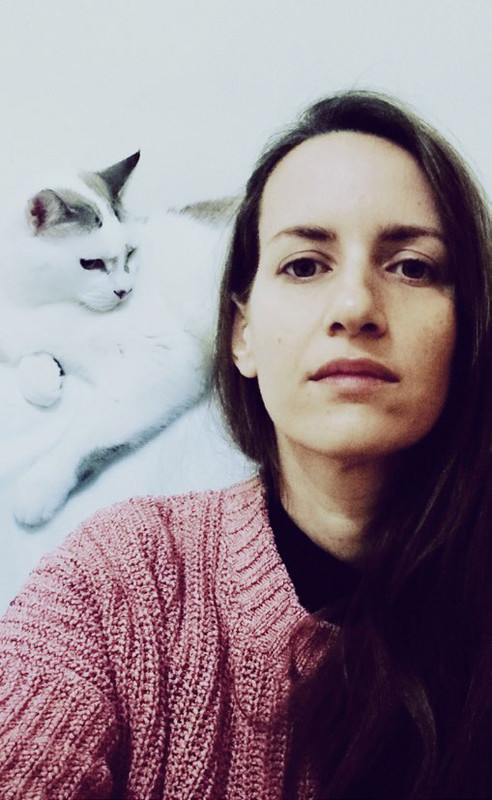
Director Biography – Vanessa Ferle
“An interdisciplinary female human, born by the sea, combining arts, design and science; through experimentations, correlations, and collisions.”
Vanessa Ferle is an artist, graphic designer and neuroscientist based in Athens, Greece. She has studied biology, neuroscience, digital arts and new media arts. Her research focuses on the animal essence that automation, machines and smart technologies infuse into digital art, and the emotional response of humans to this animal-effect.
IG: vanessa_ferle
~
DAMMI
Yann Mounir Demange, United Kingdom
16′
Returning to Paris, his birthplace, a man (Riz Ahmed) moves through the memories of his past and surreal fragments of the present, searching to connect with his estranged father. On his journey, he meets a French Algerian woman (Souheila Yacoub) who welcomes him into her world. As intimacy grows, he is confronted with his shames and fears while exploring his lost Arab identity… Behind Paris is Algiers.
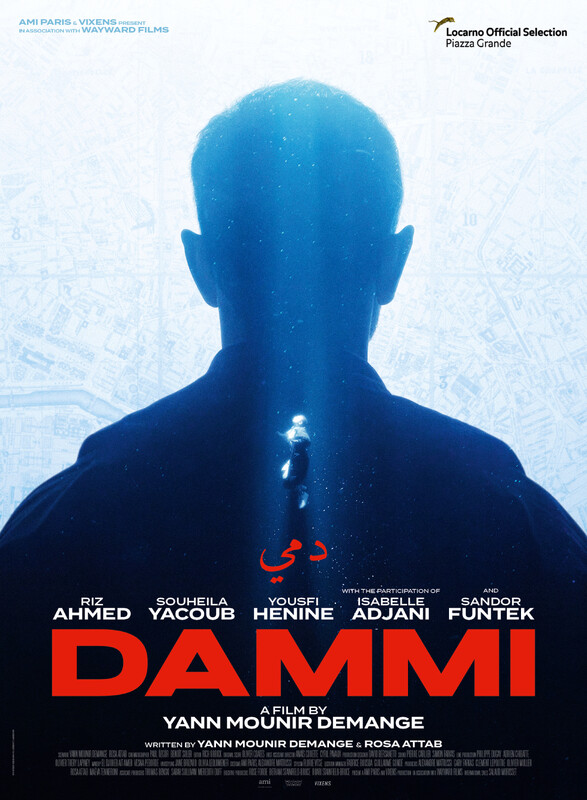
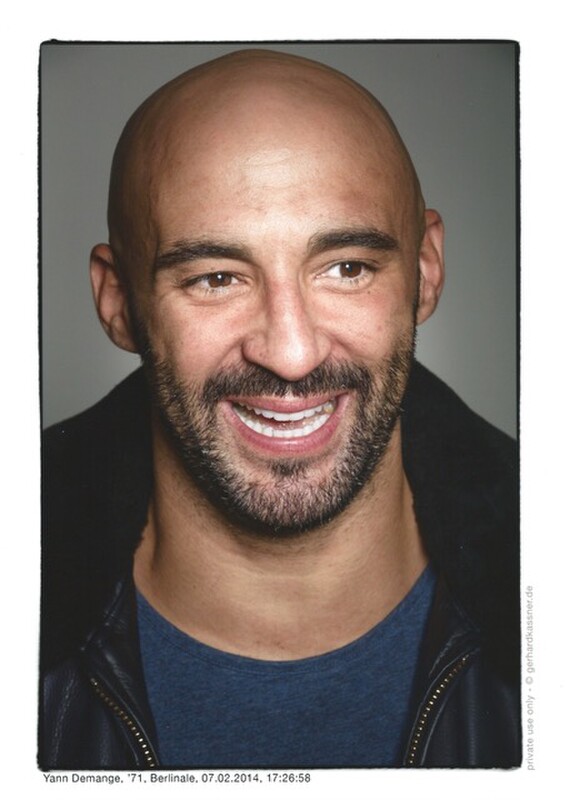
Director Biography – Yann Mounir Demange
Born in Paris and raised in London as a man of French Algerian heritage, Yann Mounir Demange has always been passionate about telling unexpected stories. Yann made a name for himself in the U.K. directing BAFTA-nominated series DEADSET, and the entire first season of critically acclaimed multi-BAFTA-nominated series TOP BOY, as well as his feature film debut ‘71, for which he received the British Independent Film Award for Best Director. Transitioning to working in the U.S., Yann most recently directed the feature film WHITE BOY RICK (Sony), and the pilot episode of HBO’s LOVECRAFT COUNTRY. He also served as an Executive Producer on Bassam Tariq’s MOGUL MOWGLI.
Mitayero
Kate Vinen, Australia
6′
This film was made in the Amazon Jungle, Peru, during PlayLab Films’ Director’s Lab with Apichatpong Weerasethakul.
Synopsis: In the liminal space between the jungle and the wide river that runs through it, steeped in myths of anacondas, piranhas and jaguars, a man has lived alone in a secluded hut for twenty years. A hunter’s voice from the past shares a dream with his wife in which wild animals seek revenge on him, placing into question how everyday life will be lived in their future. While the couple’s human drama unfolds, nature remains unphased, time and the river moving forward – or is it backwards?
Spain, Australia | 2023
Languages :: Peruvian Spanish and Ese Eja (indigenous language) with English subtitles
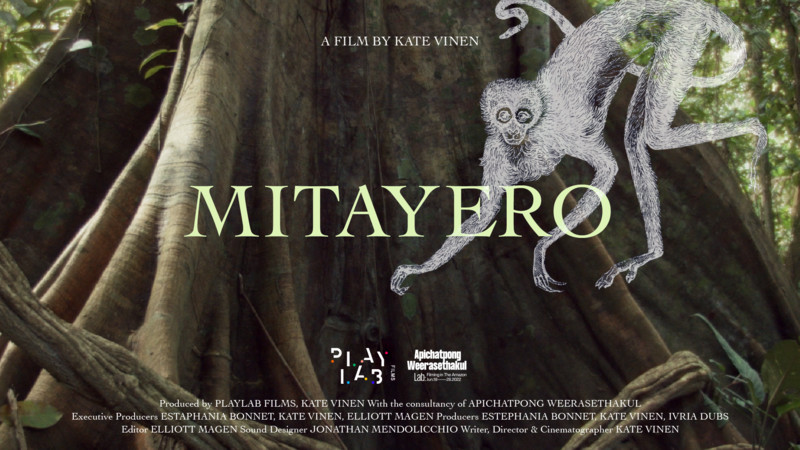

Director Biography – Kate Vinen
Kate Vinen is an award-winning writer and director based in Sydney, Australia. Kate completed a Graduate Certificate in Directing (2010) and a Masters of Documentary Directing (2018-2020) at the Australian Film Television and Radio School (AFTRS). Kate’s short film ‘Acts for the Invisible’ (writer/director/producer) had its World Premiere at Sydney Film Festival in 2021 and has since had a successful national and international run, winning the 2022 CILECT CAPA Best Film: Documentary. Her recent film, ‘Mitayero’ was made at the prestigious PlayLab Films Director’s Lab mentored by Palme d’Or winning director Apichatpong Weerasethakul in the Amazon Jungle. Projects Kate has written, directed and produced have screened in Australia and worldwide including Sydney Film Festival (Australia), Short Shorts Film Festival & Asia (Japan), DocEdge (NZ), Dhaka Art Summit (Bangladesh), Les Rencontres International (France), Asia Pacific Triennial 8 (Australia), Tampere Film Festival (Finland) and Salento International Film Festival (Italy).
Director Statement
I filmed ‘Mitayero’ at PlayLab Films’ Director’s Lab with Apichatpong Weerasethakul in the Peruvian Amazon, as one of the 50 directors selected to participate from 25 countries. I was thrilled to have the opportunity to receive close mentorship from Apichatpong, an auteur I have long respected. It was my first time working as a solo practitioner and my intention was to experiment conceptually and technically to expand my vision and craft. I set out to make presence more palpable in my work, play with the concept of time and incorporate my subconscious creative instincts and impulses. The experience was an adventurous, deep dive into the creative process and a reminder that, ultimately, film is an artifact and its form the result of the process.
Apichatpong’s theme for the lab was ‘a conversation,’ and each morning he led a 6am meditation in the middle of a waking jungle. As the days passed we became immersed in the jungle’s wild nature and Apitchatpong’s theme. Time felt elastic—the 12 days felt like moments and years simultaneously. Intimate conversation emerged—between the participants, Apichatpong and ourselves, the forest and us, between everything within the forest. The interconnectedness of all things revealed itself to us, and at times the lab felt like a spiritual retreat or a hallucinogenic experience. Apichatpong encouraged us to make more than just ‘beautiful images’. I wanted to reflect elements of my experience by drawing attention to the multiple layers of reality that exist. By slowing the film’s pace and utilising long shots, I seek to immerse the viewer and activate their sense of perception, as if to ask “What do you see here? … And beyond that image?”.
The conversation I initially wanted to explore in the making of ‘Mitayero’ is the strained relationship between nature and humankind. I am a deep lover of wild nature and believe nature has a consciousness. I am motivated by the ongoing question of how humans can live in balance with the natural world, especially at this moment in history, when extinction rates are speeding up exponentially and wilderness is rapidly disappearing. There is immense grief in the destruction of nature, and I am not afraid of that grief. I feel it’s important to connect to it if we want to face the truth about what’s happening to the environment and use it as a driving force to bring about positive change and action.
During the making of the film my ‘conversation’ expanded organically. I recognised a parallel between the fear of, and attempt to control, nature and the feminine experience, both of which have long been subjugated by the patriarchy. In the film’s conversation between the hunter and his wife—inspired by a local indigenous story—there is a parallel between the tamed jungle space where he lives and the powers at play in the couple’s relationship. I echo the last line in the film, “Must I live by your dream?”—I dream of a world where the relationship between two people, or between humankind and nature, is a reciprocal, harmonious exchange.
~
Via Dolorosa
Rachel Gutgarts, France
12′
Between drug addiction, first discoveries of sexuality and a permanent state of war, the filmmaker searches for her lost youth by wandering the streets of Jerusalem.
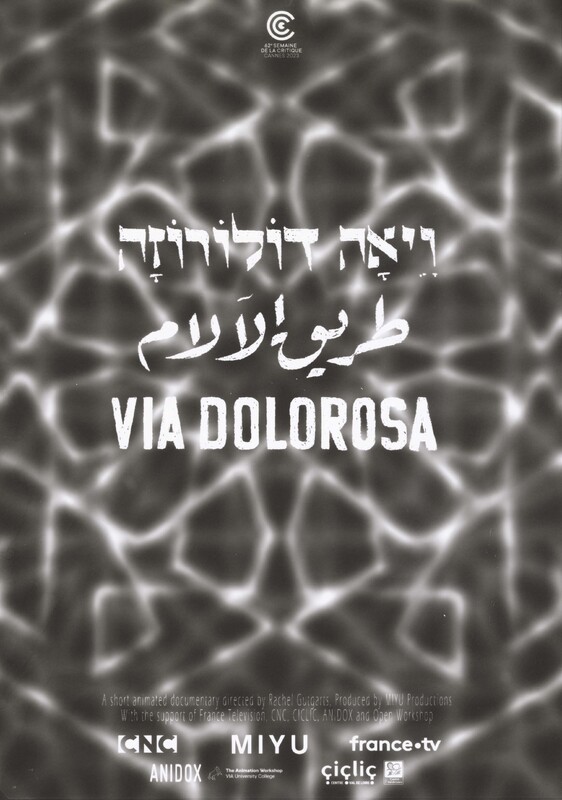
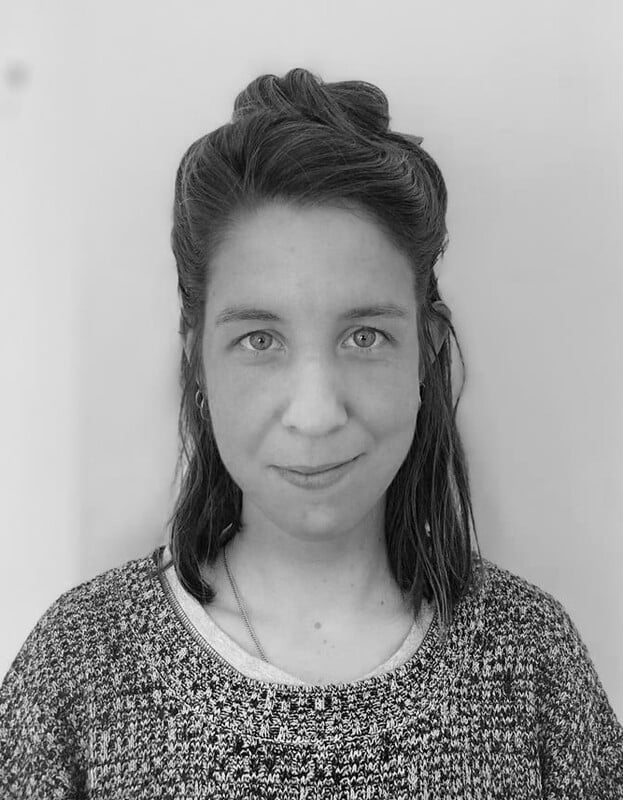
Director Biography – Rachel Gutgarts
Rachel Gutgarts was born and raised in Jerusalem. She graduated from the animation department of the Bezalel Academy of Art and Design in Jerusalem, specializing in experimental techniques, primarily animated screenprints. A Love Letter to the One I Made Up, her graduation film (2017), has been screened in numerous film and animation festivals around the world, including the Annecy Film Festival, Ottawa International, and the Leeds International Film Festival. The film received the Golden Jabberwocky, at the 2017 Etiuda & Anima festival; the Vimeo staff pick award at Animafest Zagreb 2018; and was awarded the Q-21 residency program at the 2018 Tricky Women Festival, among others. Rachel has collaborated on various projects with several independent artist studios in Israel and Europe. She currently works as a freelance animator, editor and designer, in addition to making experimental documentaries.
FÁR
Gunnur Martinsdóttir Schlüter, Iceland
5’13”
A bird hits a window of a café and disrupts its customers. A woman faces a decision on whether to ignore nature or to react.
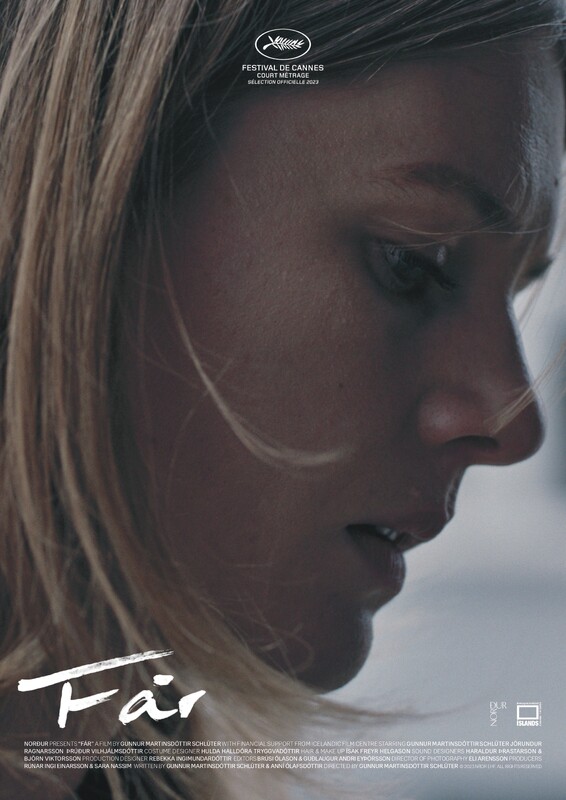
~
Carpal
Egor Isaev, Russian Federation
27’31”
Lera streams games for a living. While withdrawing her money from an ATM in the evening, she becomes a victim of robbery. A young stranger named Artyom comes to her rescue. As Lera and her savior grow closer, she realises that he knows much more about her than a random passer-by should.
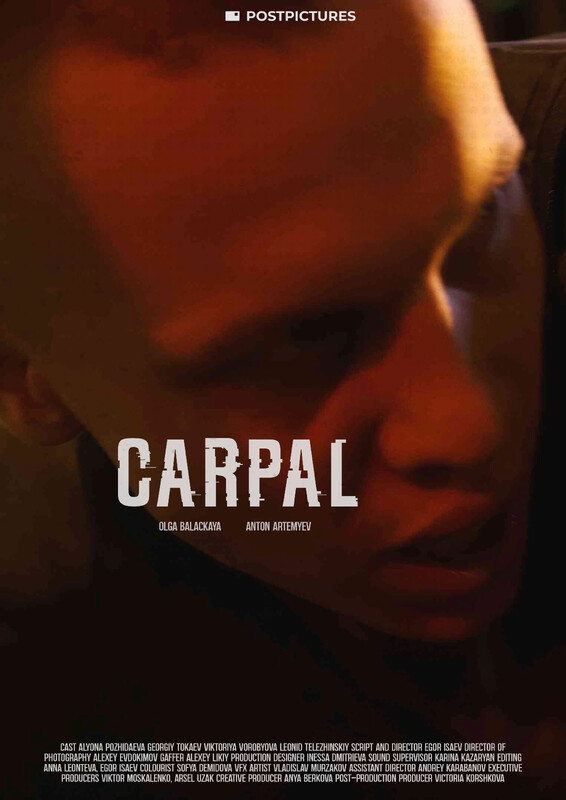
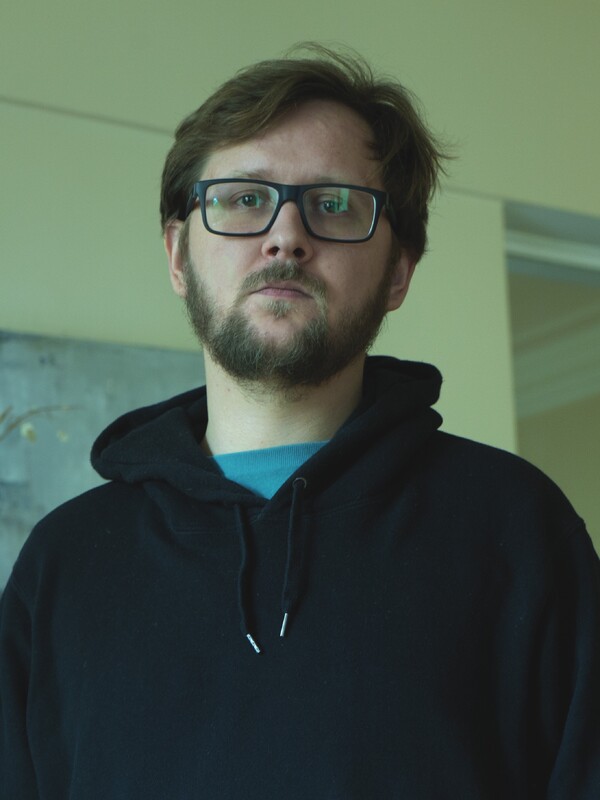
Director Biography – Egor Isaev
MA in Public History, The University of Manchester. AFA in Film Directing, Moscow Film School (supervised by A. Popogrebskiy and A. Khlebnikov). Senior Lecturer at the Media Department of the Higher School of Economics, Moscow (2014-2022).
Curator of the documentary film projects in Russian media-in-exile Mediazona. Visiting lecturer at the European Humanities University, Vilnius and the Ruhr-University, Bochum.
Director Statement
I originally planned to make Carpal (Pyast’) as a short genre film about stalking. But the deeper I delved into the subject, the more frightening and strange it became. As a result, the development phase of the project dragged on for six months, we together with the team took about 50 in-depth interviews (with victims of stalking, their relatives and the stalkers themselves) and made a series of documentary performances in the space of Teatr.doc (Moscow), conducted a social campaign drawing public attention to the problem. And only after that the work on the film continued.
The main shooting took place in Saint Petersburg in summer and autumn of 2021 after a successful crowdfunding campaign that gave us the opportunity to make the film.
But because of the Russian invasion in Ukraine and my forced departure, I was only able to continue working on it in 2023 in Berlin and Bochum, Germany.
~
The Sea in Between
Lun Sevnik, Czech Republic
15′
While helping his father with the family business, a disgruntled teenage boy is stuck on a small boat with an older tourist.
As the boy anxiously waits for his father to return with the daily catch, the tourist starts making lewd suggestions.
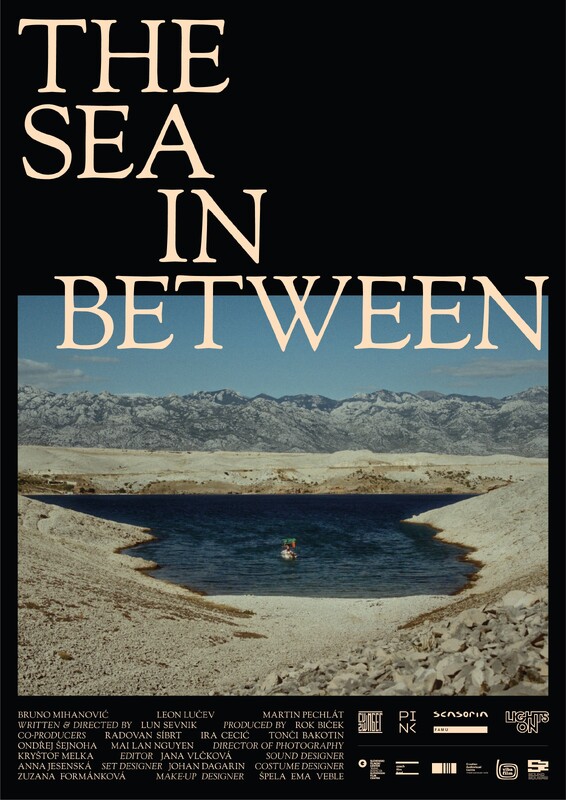
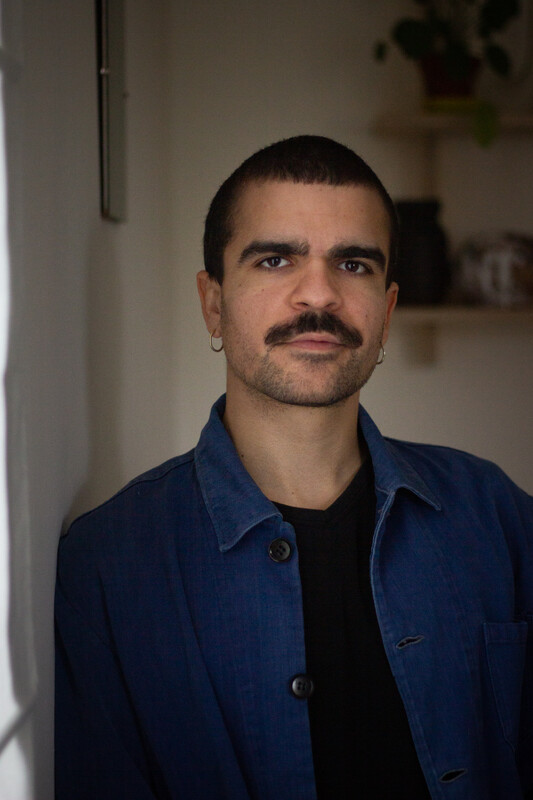
Director Biography – Lun
Lun Sevnik (1992) is a film director from Slovenia. He studied film directing at FAMU in Prague. His student film, ‘Playing’ (2019), premiered at the Karlovy Vary International Film Festival and the San Sebastian Film Festival. Alongside co-writer Atila Urbančič and producer Rok Biček, he is currently developing his debut feature film with the working title The Healers.
Director Statement
In the crucial moment, when the son needs his father’s support the most, the father turns his back on him. This event not only leaves the son forever marked by a traumatic experience but also represents the ultimate breakdown of his father as a moral authority.
~
CRACKLE
Fränk Grotz, Luxembourg
17’50”
Socially isolated record dealer Paul’s attempts to get close to a woman who fascinates him turn tragic when his frustrations cause him to lose control…
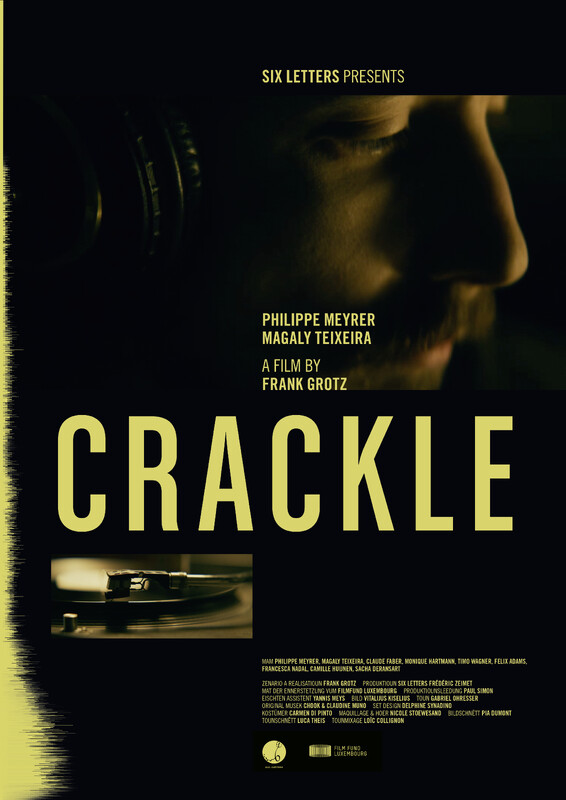
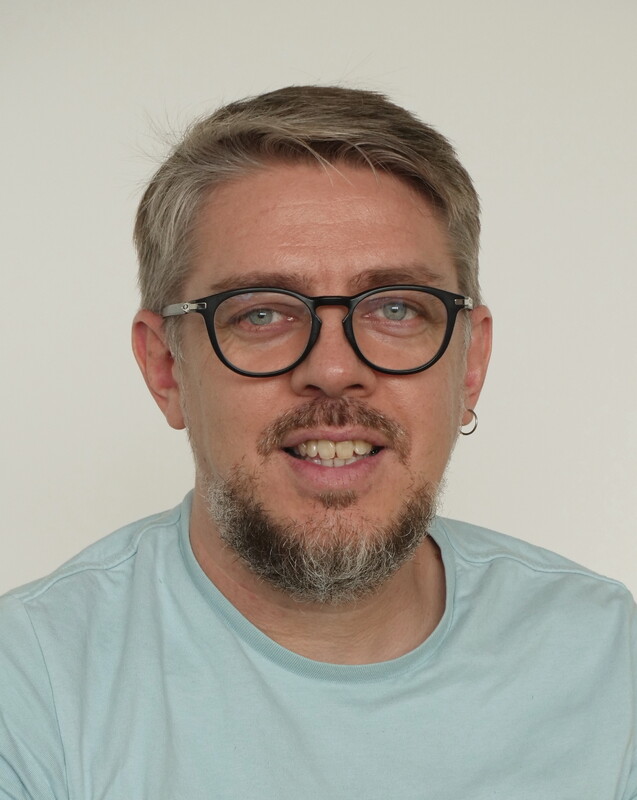
Director Biography – Fränk Grotz
After studying performance arts in France, Luxembourgish director Frank Grotz explored cinema as a critic and as a movie theater manager before mainly focusing on directing.
His most acclaimed works include “d’Schueberfouer” an experimental short, studying the visual habits in amateur film and “Ad Vitam Aeternam”, a documentary short on the life and motivations of a taxidermist.
Director Statement
Paul’s longing for affection generates stress and frustration. But denying his personal failure in channeling emotions, opening to the world and adapting to real life situations, has put him on a
dangerous path. Crackle intents to show the destructive effects of self-isolation and the way Paul finally ends up becoming an offender.
Crackle challenges the spectator and puts him in an emotionally difficult situation: being witness of a transformation and feeling empathy for someone who turns into a monster.
The ever-present music in his ears has become a hurtful sedative and his love for the songs of the 80’s relates to a past of his that we can only speculate about. The confined, calm mood of his record shop contrasts with the bright and busy ambiance of Laura’s bakery, challenging his senses. As on the party he sneaks in, Paul acts clumsily and focuses on himself instead of really listening to peoples responses. The sound design enforces the increasing sens of isolation, frustration and derailment as Paul evolves from a shy record shop owner to a dangerous stalker.
B’
The life and work of Yanoulis Halepas
Zina Papadopoulou, Greece
6’32”
Onassis Education presents an animated mini-biopic featuring the novel-like life and extraordinary work of the Greek sculptor Yanoulis Halepas.
Born on the island of Tinos in the mid-19th century, he met with massive acclaim at a young age, spent years in a psychiatric hospital, and was artistically reborn in the twilight of his life, a little before the outbreak of the Second World War. Thanks to their long history of marble cutting and carving, the Halepas family have left an indelible mark on the island, which is also home to a School of Fine Arts.
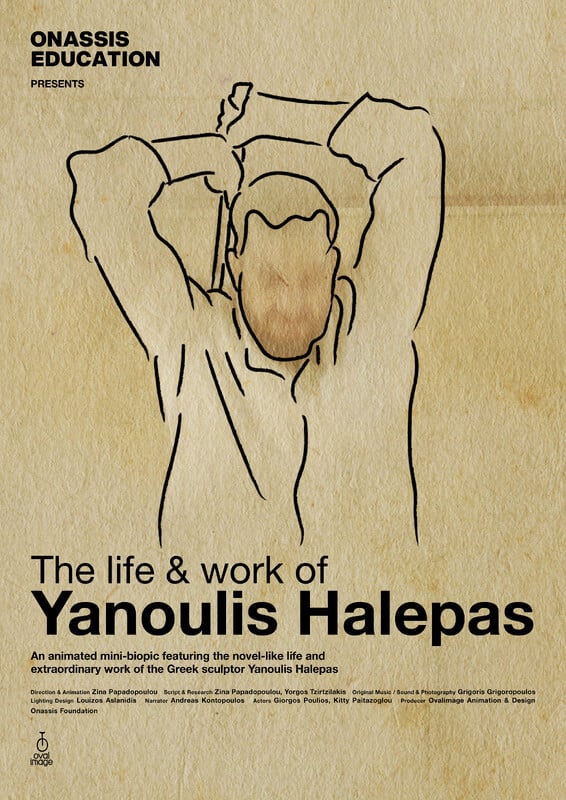
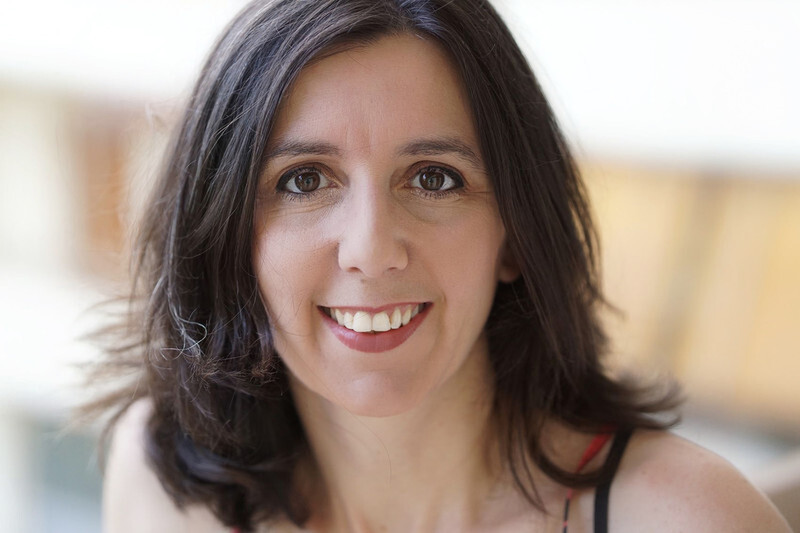
Director Biography
Zina Papadopoulou is an independent director, animator and visual artist. She expertly blends video, animation, and photography to craft captivating narratives. Zina studied Graphic Design at the Technological Educational Institute of Athens before pursuing her Master’s degree in Animation at the Utrecht School of the Arts in the Netherlands.
Director Statement
With this animated documentary we wanted to present the life and work of Yanoulis Halepas through his own works and especially his sketches.
The animation has a mixed technique. Hand-painted elements in a freehand style reminiscent of his drawings, combined with videos / photos of the sculptures. For the background we use the texture of old paper, as well as the red and black lines of account books, similar to those used by his father as a marble merchant. In one scene the lines thicken and symbolize his incarceration in the psychiatric hospital of Corfu.
~
The Masterpiece
Àlex Lora, Spain
20′
Leo and Diana, a rich couple, bring a broken TV to a recycle point. They meet Salif and his son, two scrap dealers. Diana asks them to come to their house to get more objects. Once there, Leo looks at them collecting objects with mistrust, until they see the scrap dealers have something they want.
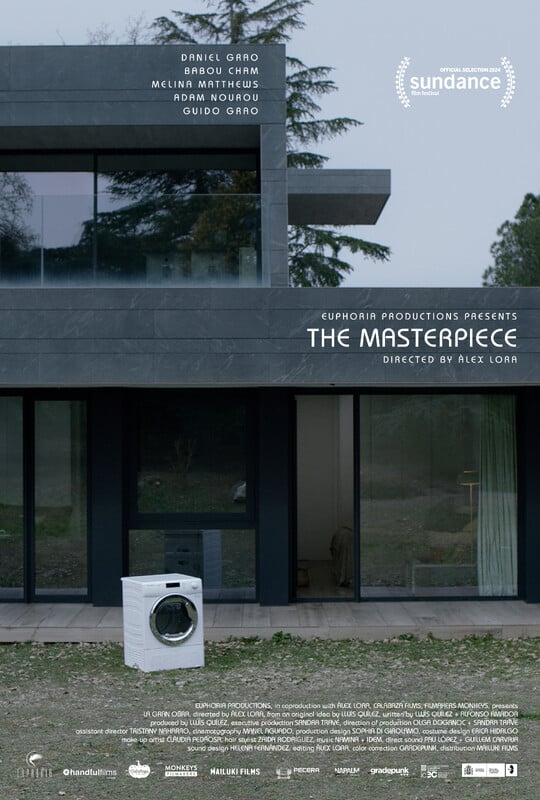
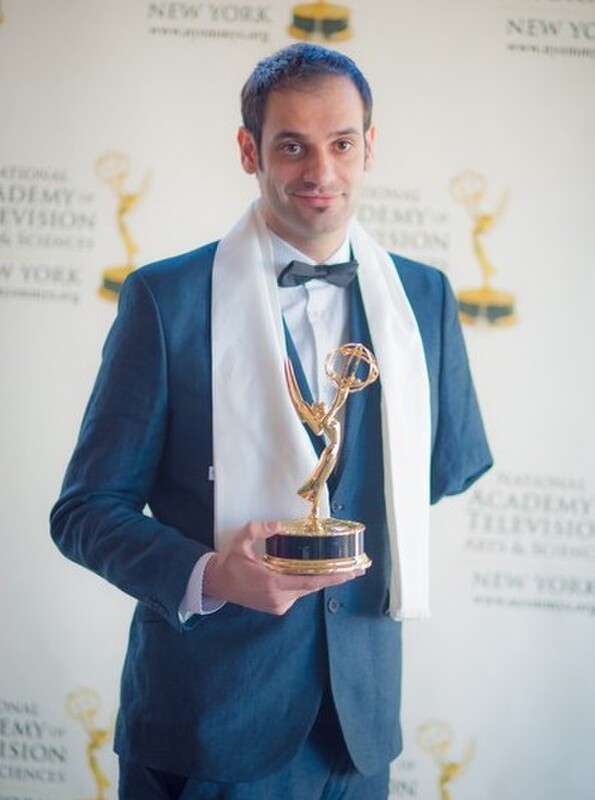
Director Biography – Àlex Lora
Àlex Lora is a director, screenwriter and editor, winner of 7 Emmys, 2 Gaudí Awards, Nominated for the Goya and the Oscars Student Academy Awards. He has screened his work at Sundance at official competition 3 times, and has won more than 100 awards at international festivals. His works include: Enterrados (2009); Us (2011), Odysseus’ Gambit (2012); Only Solomon Lee (2013); Godka Cirka (2014), Thy Father’s Chair (2015); Ways (2016); The Fourth Kingdom (2019), Savage Land (2020) -screenwriter and editor-; We Are Living Things (2021) -screenwriter and editor-; Unicorns (2023), and The Masterpiece (2024).
Director Statement
“One could think that THE MASTERPIECE is the painting, or even this great short film! but it is actually the system, the fight behind the free market, the money, the capitalism, the North vs. the South, the West vs. East, the wealthy classes against everything else, playing with lives in that white and black squared board. Maybe the only real racism is economic? the rest is history…”
~
TSIKITIGKLON, THE FAIRY AND THE MAN
Alison McAlpine, Canada
15′ 20”
In the dazzling incandescence of an unknown desert, three donkeys discover an abandoned astronomical observatory and the universe. A sensorial, cinematic exploration of what a story can be.
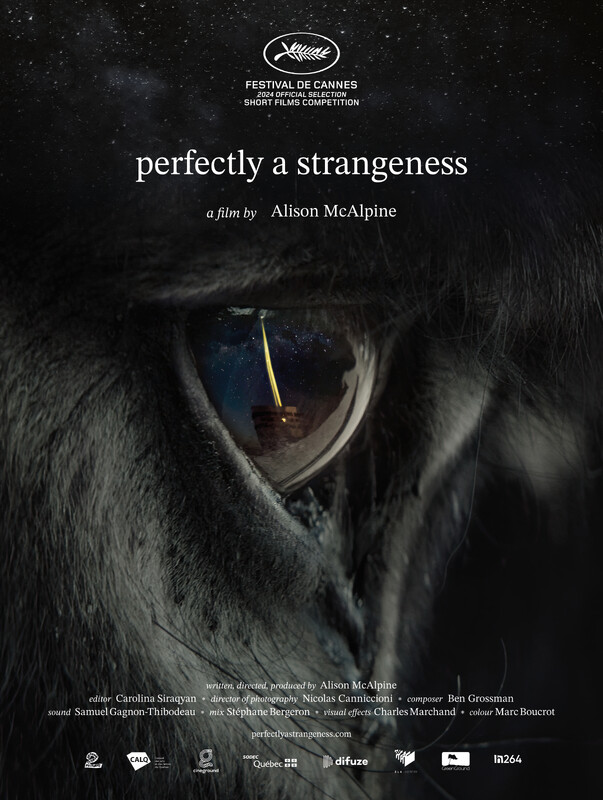
THEATER
Anastasia Lola, German/Greek
13′
People working backstage, during a theatre play.-Alles gut?-Alles gut? They act according to time -Alright. They wait for the right time to act. Moin!The accident happens.
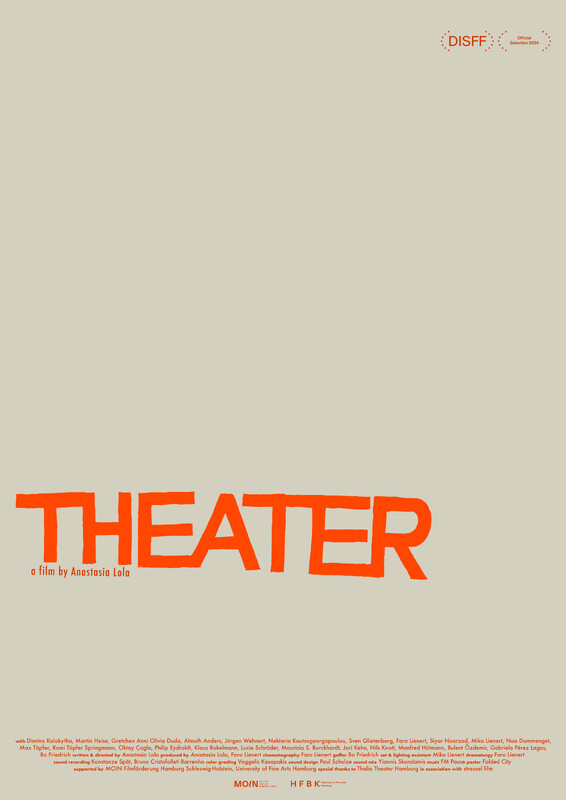
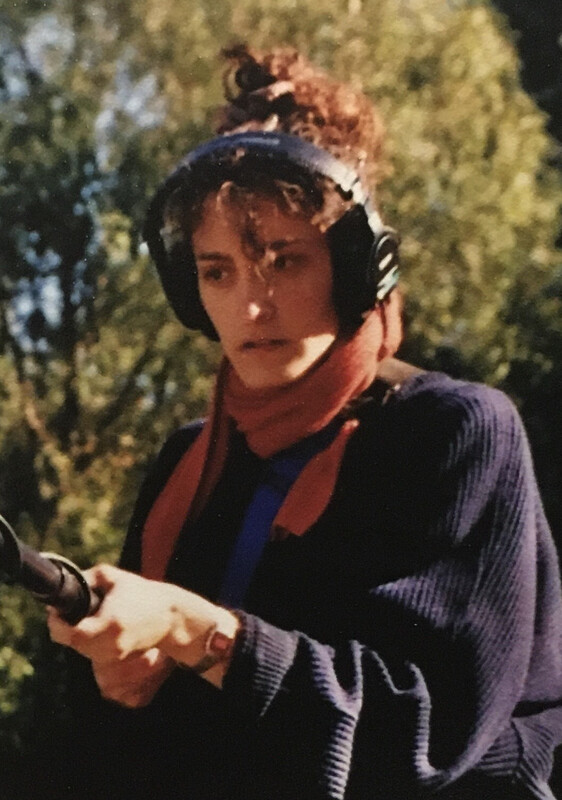
~
The Chaos She Left Behind
Nikos Kolioukos, Greece
33′ 40”
Anna feels like her life is slipping through her hands. A ticket to a music school in Paris might be the last chance to pursue her dream, but her self-destructive alcoholic father stands in her way.
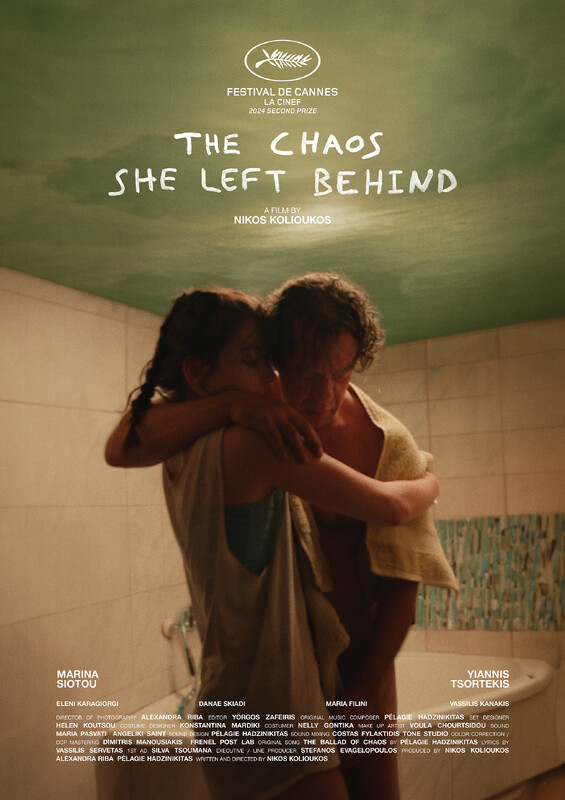
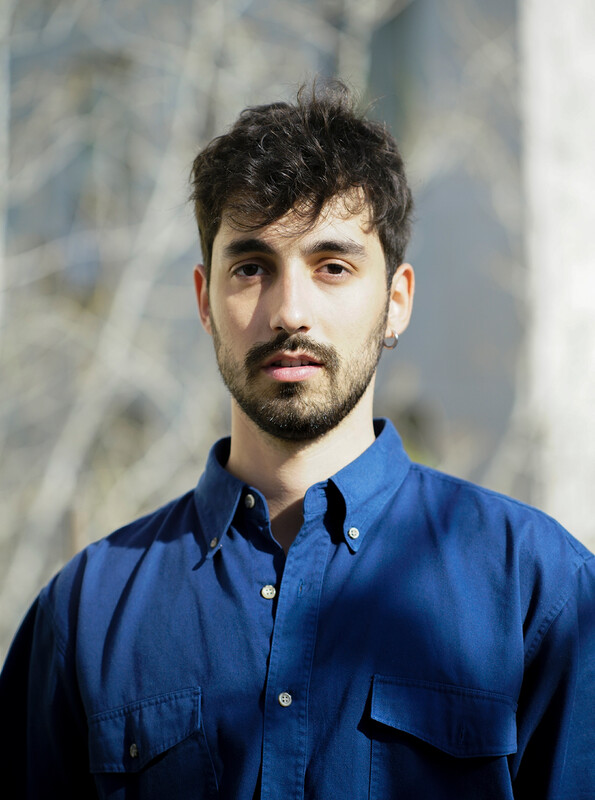
Director Biography
Nikos Kolioukos (b. 1996) is a film director based in Athens. He graduated from the Film Department of the School of Fine Arts at Aristotle University of Thessaloniki.
His debut short film, The Chaos She Left Behind, was awarded 2nd Prize in LA CINEF at the 77th CANNES FILM FESTIVAL.
This year, the film also received the Best Student Film “Iris” Award from the HELLENIC FILM ACADEMY. Ιt won the Best Director and Best Leading Actress awards at its national premiere in the national student competition at the 46th DRAMA INTERNATIONAL SHORT FILM FESTIVAL. Subsequently, the film was showcased at the 64th THESSALONIKI lFF and is now officially selected for the 30th SARAJEVO IFF.
Recently, the GREEK FILM CENTRE commissioned Nikos Kolioukos to create the official promotional campaign, using the visual identity of his award-winning film, to represent the organization at the 64th THESSALONIKI IFF.
Currently, he is preparing his next medium-length film, Amnesia (Homemade Films Productions), a queer love story set in the working-class Thessaloniki of the 1980s.
Director Statement
I am interested in contrasts and contradictions in life, complexity, and the unexpected power of emotions. In this film, I aimed to ensure that Anna’s relationship with her father would be sincere, realistic, and intricate. I wanted to show that light exists within the darkness and that love emerges even in the depths of selfishness.
Journey to the end of the world
Giannis Andrias, Greece
18’34”
Locked inside her home, Eleftheria gets an unexpected visit from Demetra, leading to a collision of two vastly different wolds.
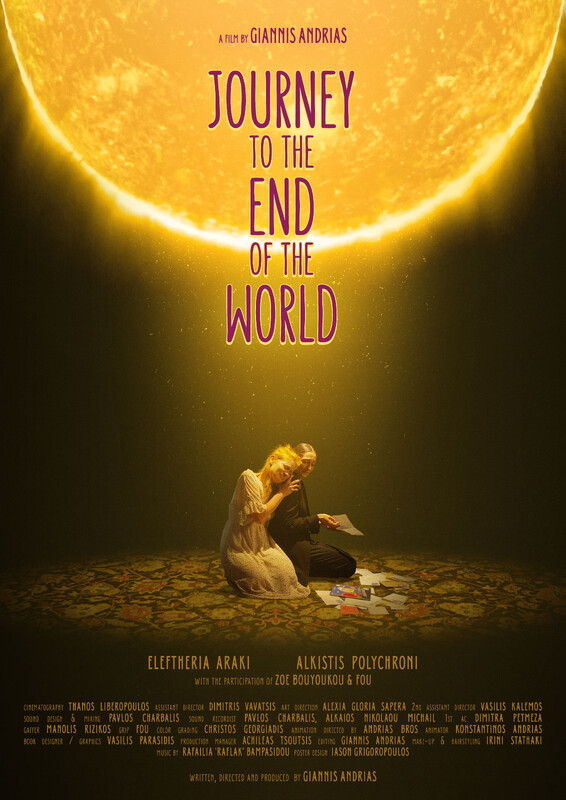
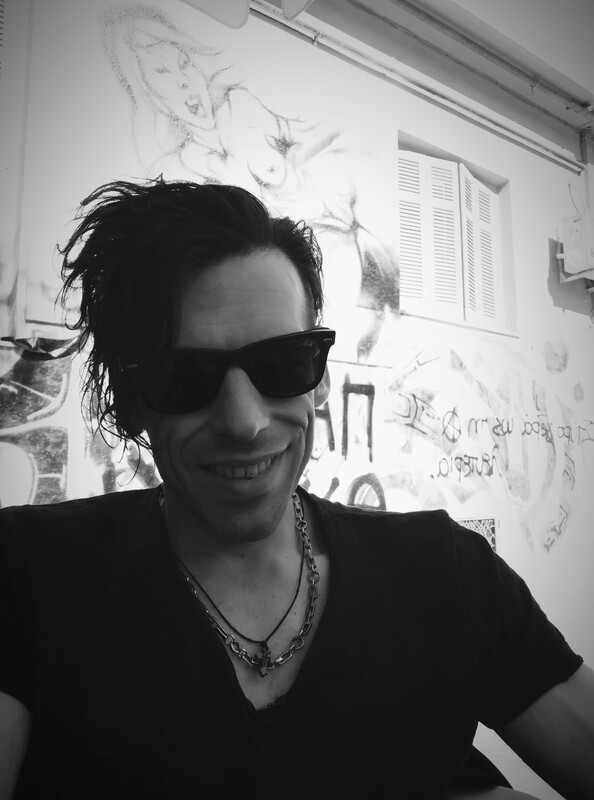
Director Biography
Giannis Andrias was born in Thessaloniki, Greece. His passion for cinema propelled him to explore various roles within the industry, primarily focusing on editing and cinematography. As a writer-director, he has completed five short films. His debut short film, “Party Animals” (2013), was officially selected at the prestigious 36th Drama Short Film Festival and showcased at the renowned Thessaloniki International Short Film Festival. Additionally, it received a notable mention at the Loutraki Short Film Festival.
Furthermore, Giannis, alongside his brother Konstantinos Andrias, is currently developing an intriguing animation series titled “Greek Myths: The Antiheroes.” This ambitious project, aimed at reimagining classic Greek myths, was introduced at the Athens Animation Agora by Anima Syros and also made a notable appearance at the esteemed Annecy Animation Film Festival.
Through his work, Giannis Andrias continues to tell stories that seek the depths of our phyche and society.
Director Statement
During a visit to my brother over the Christmas holidays, I encountered an extraordinary story about a woman consumed by the irrational fear that the sun would suddenly explode, bringing about the end of the world. In her distress, a kind-hearted psychologist remained by her side, offering comfort and companionship as they awaited what she believed to be the apocalypse. When the anticipated doomsday did not arrive, the woman began to confront and conquer her crippling phobia. This peculiar and poignant narrative inspired this film.
This story led me to ask: What is the end of the world? Initially, we might think of an apocalyptic event, but it is also something deeply personal for each of us.
And then, in a dream, where I heard the end title song (which I inevitably included in the film), everything came together and led me to a story of isolation and a journey from darkness to light, where our fears and life distresses bind us in a continuing grief and sometimes only with the helping hand of a stranger in our lives we can be able to overcome this.
The main character, Eleftheria (in Greek her name means Freedom), is an artist who writes children’s books. After enduring immense pressure, personal turmoil, and a looming deadline for her new book, she becomes paralyzed by the fear of the world ending. Her co-protagonist Demeter is devoured by the loss of her precious daughter looking for her lost letter seeking “little scrambles” of her.
The film explores this theme of moving from darkness to light, using light as a crucial storytelling element. Every significant event in the narrative is marked by a change in lighting, symbolizing the unfolding mystery and the gradual warmth in the relationship between the two characters.
Inspired by The Greek Mythology,” I drew parallels to the myth of Persephone. When Persephone was kidnapped by Hades, Demeter searched everywhere and asked the sun, the all-seeing eye, for help. Despite knowing, the sun did not assist her, and only with Hecate’s help did she find her daughter. This myth inspired the development of the characters’ relationships in the film and the idea of the “daughter’s” missing letter.
A significant effort was made to obscure the exact time period of the events. From the letters to the cassette player, I aimed to depict the end of something close yet surpassed—a farewell to the analog world as we embrace the digital age.
The end of the world is both global and personal. We live in dangerous times, and humanity is at great risk; with a slight mishap, our end could be inevitable. As Demetra hints at the film’s conclusion, “I knew this jerk would burn us all.” We must not let it happen.
~
Susurro
Gabriel Gonzalez Acosta, Mexico
13’01”
Susurro is a sonic narrative film that follows the journey of two women who climb to the top of a desolate mountain searching for the whisper of the universe. The film explores themes of spirituality, transcendence, mysticism and communion using minimalism as a narrative device to create potent ethereal worlds that summon the power of the physical realm into an aural exchange with the spiritual dimension.
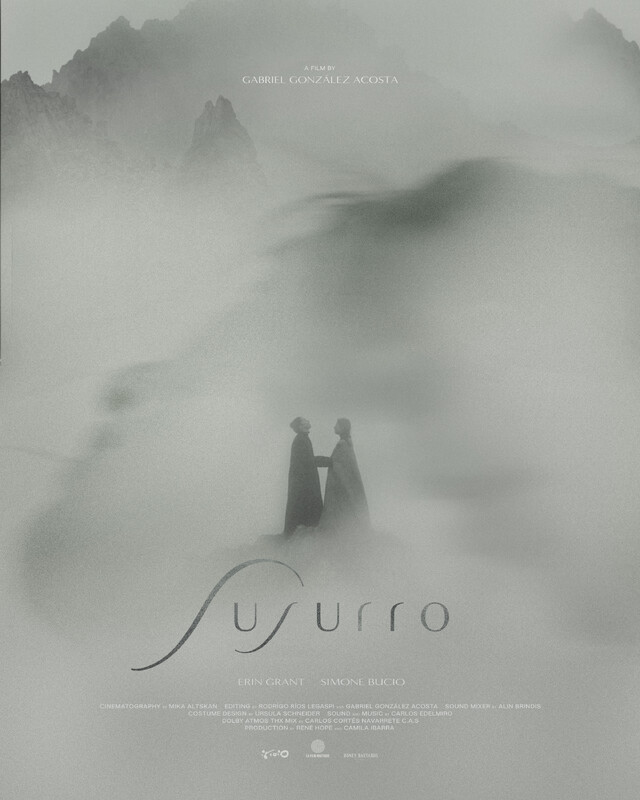
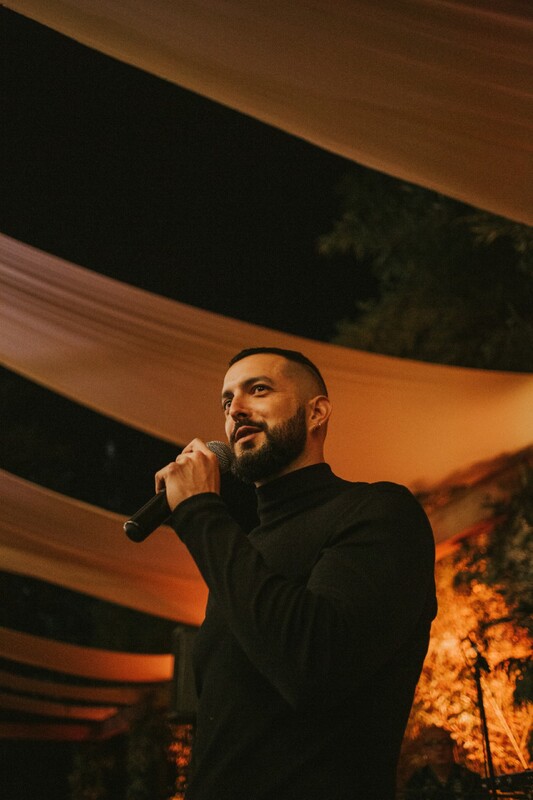
Director Biography – Gabriel Gonzalez Acosta
Gabriel González Acosta is a Mexican filmmaker and theatre director. His work explores the staging of worlds and the role of narrative, dreams, magic and place in the age of extinction. His first short, Concertina (2021) had its world premiere as part of the LAB Official Selection of the 2022 Clermont Ferrand Short Film Festival, where it was nominated for the Grand Prix. It has been selected in more than 50 international film festivals including HollyShorts, Atlanta ShortsFest (Best Director Nominee), Guanajuato International Film Festival (Best Mexican Short Nominee), The Norwegian Short Film Festival, BIAFF, amongst others. His second short Luciernaga (2022) was made under the guidance of Apichatpong Weerasethakul as part of PlayLab Film’s Filming in the Amazon residence.
He is currently in preproduction of his latest project Genesis, to be filmed later this year in Mexico. He is also in the early stages of development of his first feature film. His work has been presented in institutions and publications such as Museo Tamayo (Mexico City), HB Studio (New York), and Klima Magazine.
He received a PhD in Philosophy, Art and Critical Thought from the European Graduate School. He also holds degrees from The Royal College of Art and Queen Mary, University of London. He lives and works in Mexico City and New York City.
Director Statement
Susurro is an homage to silent cinema and the inherent magic which was palpable in early movies. As a director I am interested in the idea of a movie where narrative is built primarily through sound. There is almost no dialogue in the movie, only the absence and presence of sound as the marks of narrative time. These continue building and pulsating until the climax of the movie, the idea is to build through absence, until the arrival of sound becomes an overwhelming sensation of culmination.
The piece has always tried to operate through the sensorial qualities of cinema. I strongly believe in cinema as an art of presence, not representation. In this way, the film decides not to dwell too much on characterization and specific plot points, but rather turns its attention to the temporal-sensual moments which film is able to present. The piece was always conceived to be shown in the movie theatre. In this way it is about a communal experience of sound, light, movement and silence. I am deeply interested in what silence does to a group and to the experience of sharing silence with complete strangers.
When initially conceiving of Susurro, I was thinking about the sense of possibility and futurity that was associated with cinema in its early years, as a transformational power of technology. Susurro in this way takes inspiration from the early possibilities of the medium, with its simple yet evocative power, and explores certain tropes of the sci-fi genre, such as George Mellie’s Journey to the Moon or further on, Chris Marker’s La Jetee. The film is my love letter to early cinema as a portal for unknown magic and wonder.
Finally, Susurro is a story that deals with and in minimalism. Working with the most basic threads of cinema: faces, light, sound, costume and landscape, to evoke the alchemic possibilities which the medium carries. For me, cinema has always been a place of seances, the flicker of ghosts and spirits, touching transcendence.
~
Night Shows
Anand Sapin, France
9′ 59”
A teller of a neglected movie theater is hopeless. A man arrives and is confronted by the place and an unhealthy aura.
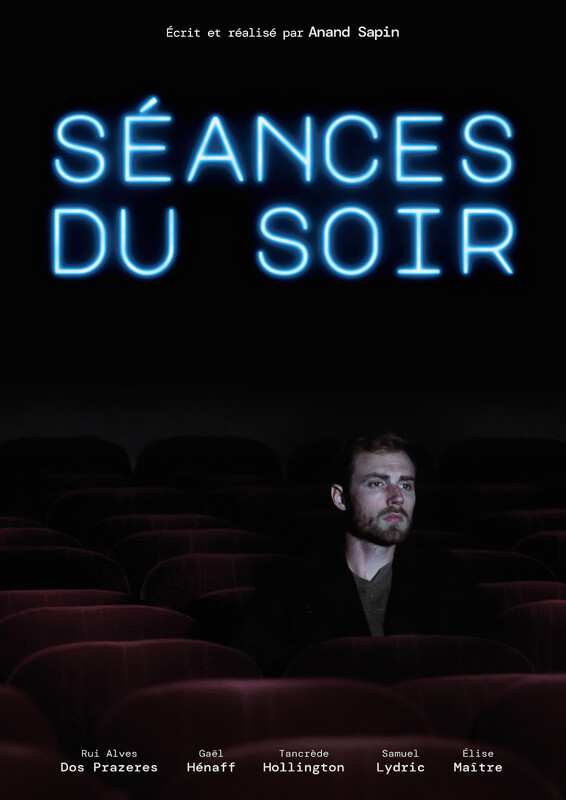
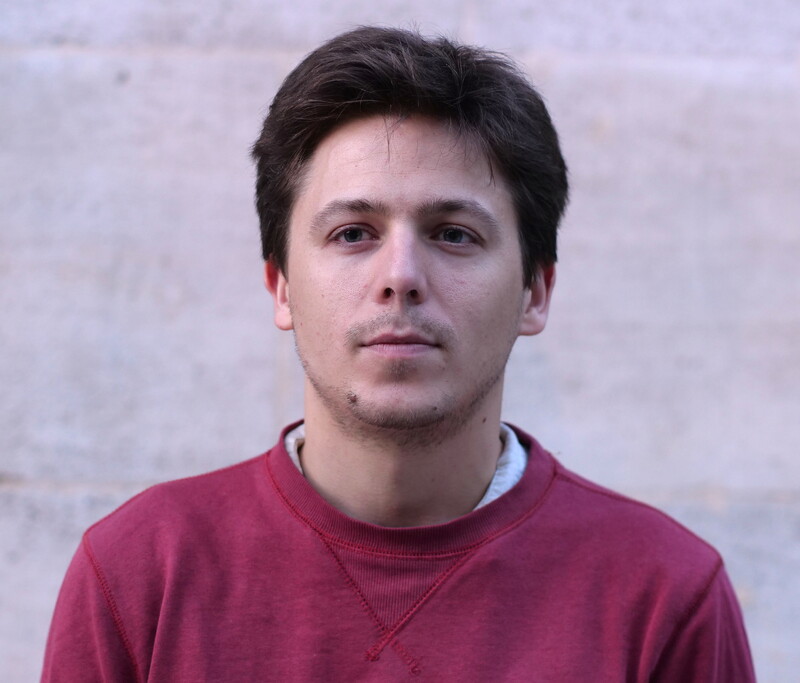
Director Biography
Passionated and curator of old movies
Bye Bye turtle
Selin Öksüzoğlu, France
24’35”
Inci’s mother is dead. That day, while maundering in the deserted plateaus of the Black Sea, the young Inci meets Zeynep (30). Back in the region after a long absence, Zeynep carries a bulky black bag. Even if they are total strangers, Inci and Zeynep join their solitude for a while, wandering over the foggy and sunny mountains, from one father to the other, from dawn to darkness.
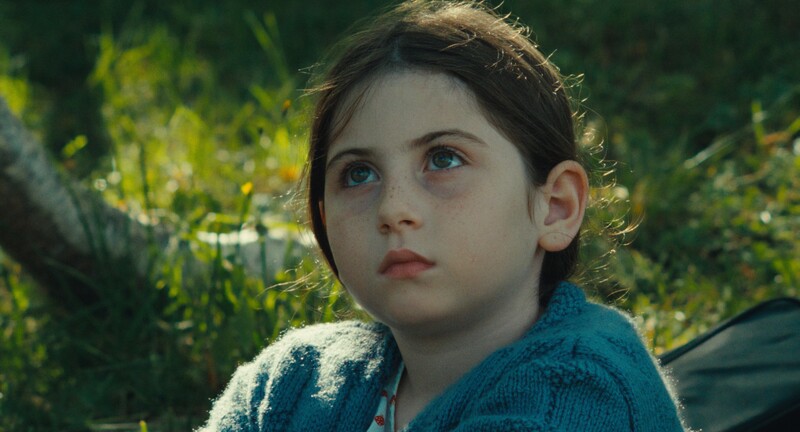
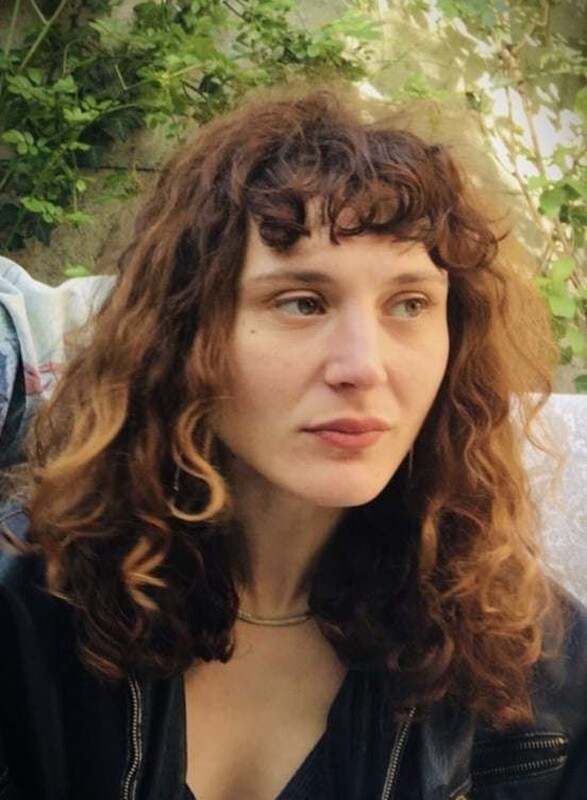
Director Biography – Selin Öksüzoğlu
Selin was born and raised in Turkey. In 2010, she arrived in France and studied psychology. She works as a psychologist with people in exile and youngsters in foster care. In parallel, auto-didact, she joined in 2019 the writing residency La Ruche Gindou Cinéma thanks to which she developed her first screenplay “Bye Bye Turtle”.
~
No Future Kids
Eleni Poulopoulou, Greece
20′
Alex and her friends go on a trip away from Athens. Soon she will realize this decision is bringing her closer to everything she hoped to escape from.
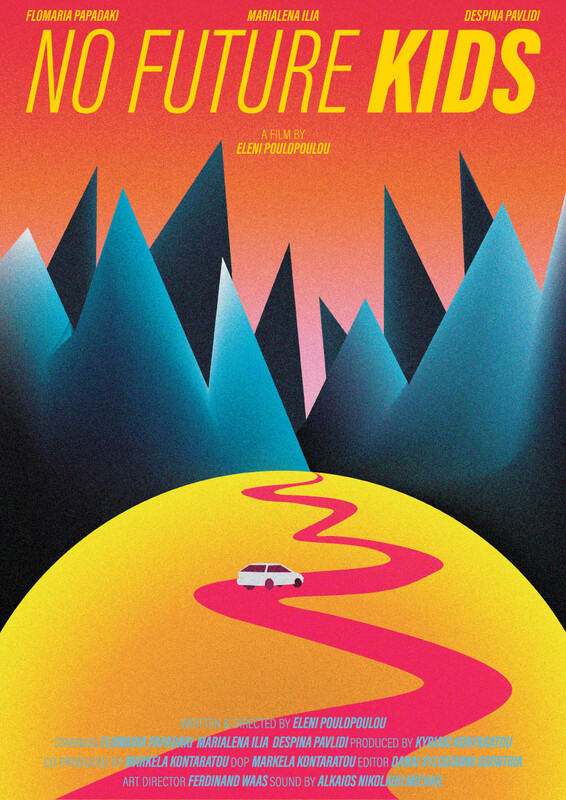
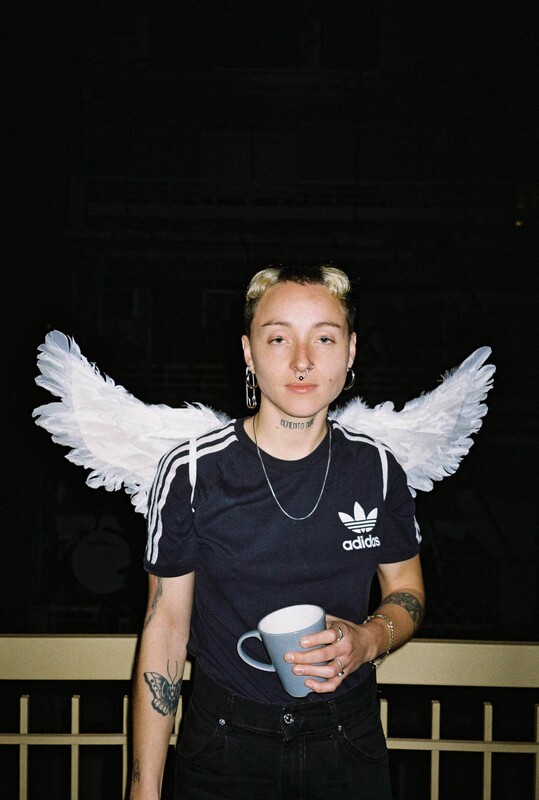
Director Biography
Eleni Poulopoulou is a multidisciplinary artist based in Athens, GR. She studied at the Athens School of Fine Arts, with photography and video art as her main disciplinary practices. She has worked as a photographer in multiple fields and has participated in various exhibitions internationally. Her work as an art director in film projects led to her directorial debut with “No Future Kids”.
Director Statement
«No Future Kids» is a short film about the difficulties that young people face in Greece, a country lacking real opportunities (no future generation). In an environment where young people are considered a threat to the moral values of an outdated society, they are violently pushed to its’ margins. Unemployment, high cost of living, social, financial and gender inequality create real and imaginary fears, affecting mental health and building walls around the protected social values. The story is told from the point of view of femininities, and how they deal with these matters throughout the film. Alex and her friends try to escape this reality by taking a road-trip. However their problems will follow them, emphasizing the futility of their efforts. In the end, Alex’s only escape is maintaining her own point of view through her video diaries. This is also my own means of expression as an artist and queer person. “No Future Kids” is exactly that, an action of resistance by rewriting our history and experience.
~
Burning away
Romane Lepage, Canada
14’50”
After a long trip abroad, Aurelie reunites with her friend and her memories, but above all with Arnaud, whom she had left without warning.
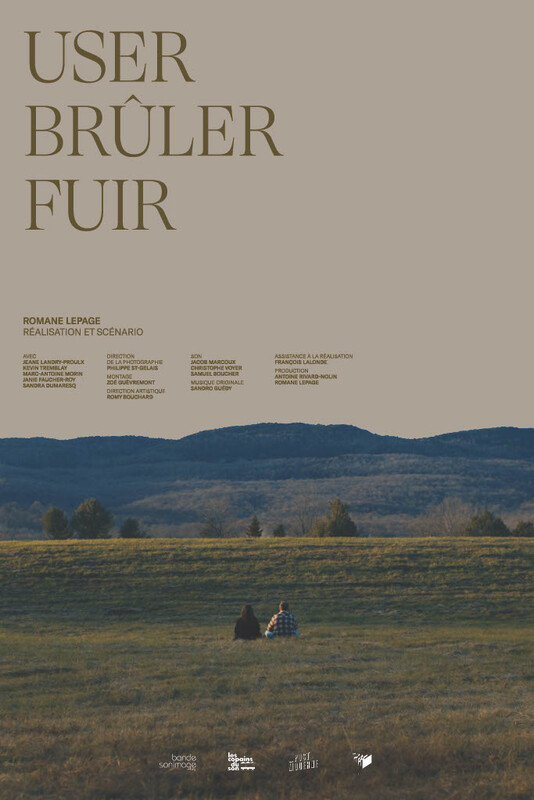
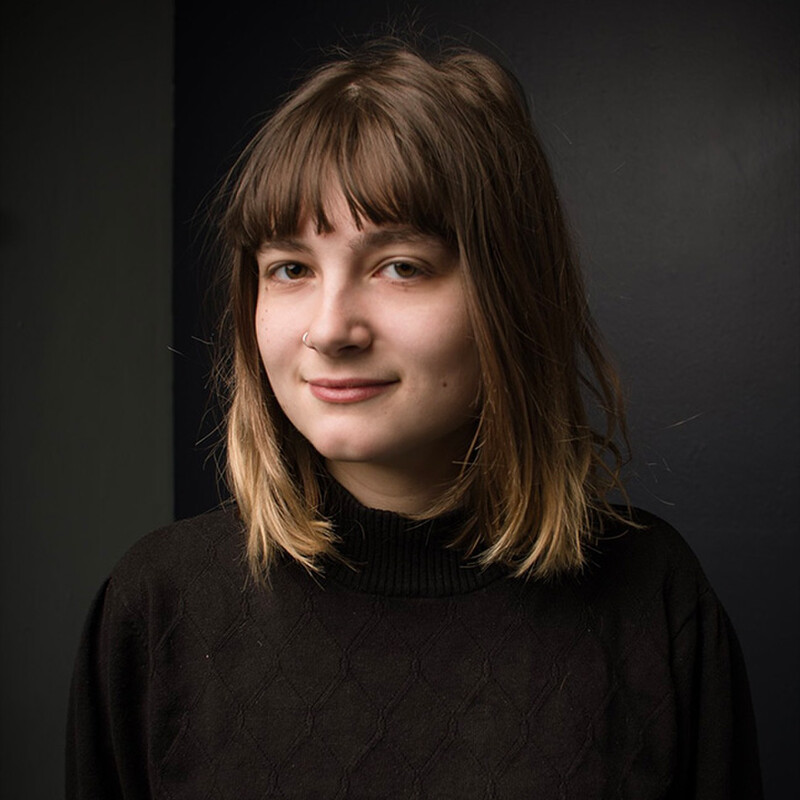
Director Biography – Romane Lepage
At the end of her studies at UQAM in cinema, Romane Lepage won the award for best graduation short film. Since then, she works as an assistant director and explore the in-between areas of human relationships in her projects of short films.
~
Swallowing Dust
Achille Bocquier, France
16’37”
A young man drives aimlessly searching for someone to spend the night with, carrying with him the fires and smoke of past summers. But he is not alone; from his bedroom window, he can see a tree, the only witness to his wandering.
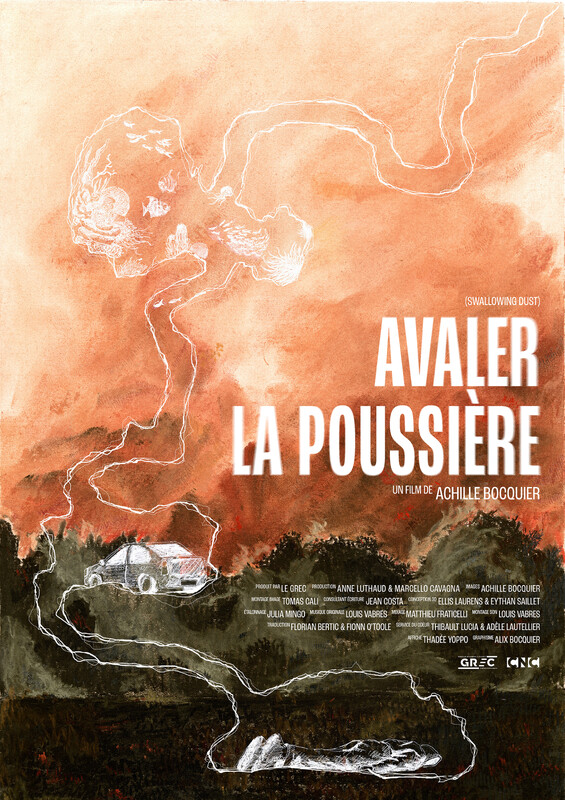
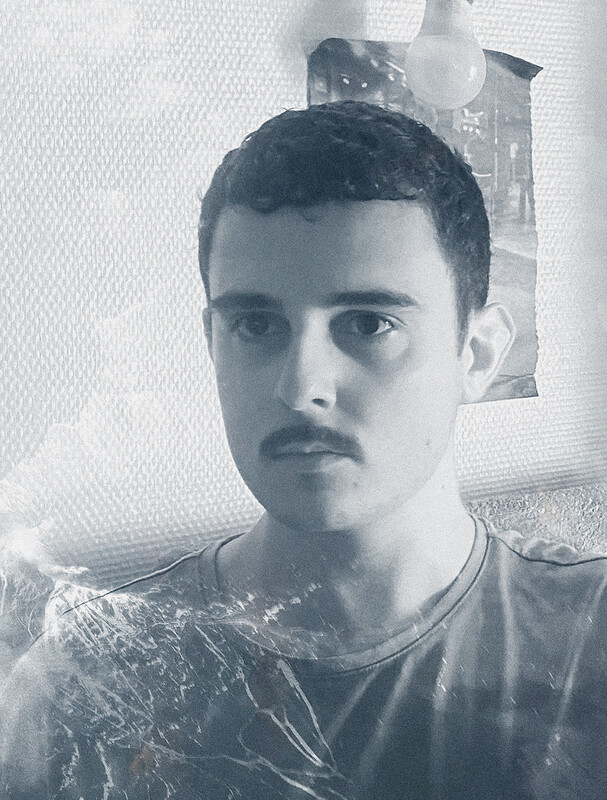
Director Biography – Achille Bocquier
Born in 1998 in the west of France, Achille Bocquier moved to Paris in 2016 to study film. While working as an assistant set designer, he has been developing his own fiction and documentary projects that focus on desire and its fantastic deviations. With “Swallowing Dust”, his first short film produced by the GREC, he evokes the solitary summer wanderings of a provincial boy.